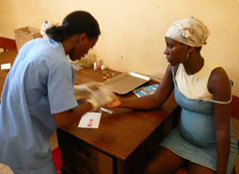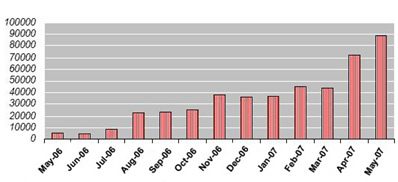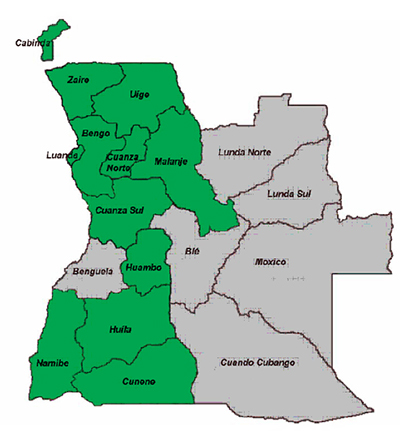Helping to Bring Effective Malaria Medicines to Angola
The Republic of Angola became one of the first countries to receive support from the President’s Malaria Initiative (PMI) in May 2006. At the time, Angola was recovering from three decades of civil war, which decimated approximately 80 percent of the country’s public health facilities; only about 30 percent of the population had access to public health services. Angola’s pharmaceutical and medical supply systems were largely inadequate, and outside of Luanda, the capital, public health facilities often faced shortages of qualified health care staff.
In September 2004, the Government of Angola had changed its first-line malaria treatment to an artemisinin-containing combination treatment (ACT), artemether-lumefantrine or Coartem®, because of the high levels of resistance to traditional antimalarial monotherapies. However, Angola faced several challenges in getting the new medicines into health facilities.
 |
Courtesy Photo |
Challenges to Rolling Out Coartem® in Angola
Impeded distribution to health facilities
The Government of Angola lacked sufficient vehicles to distribute medicines throughout the country, and transport was even more difficult during the rainy season, when flooding made many roads impassable.
The first shipments of 1.1 million Coartem® treatments, funded by the Global Fund to Fight AIDS, Tuberculosis, and Malaria, remained in the central warehouse for several months before distribution. Then, the PMI shipment of ACTs that arrived in Luanda in January 2007 was delayed two weeks because of flooding.
Inadequate diagnostic capabilities
Concerned that overuse of ACTs might promote resistance to the new antimalarial combination therapy, the Angolan Ministry of Health decided that only health facilities capable of performing laboratory tests would be allowed to dispense Coartem®. However, only 10 percent of health facilities in Angola had laboratories, and only 10 – 20 percent of all malaria diagnoses were based on blood examinations. Laboratories faced serious shortages of qualified staff, equipment, and reagents.
A large portion of the first order of Coartem® came in blister packs appropriate to treat children under 8, which meant that facilities risked running out of the treatment for adults within several months of receiving it. PMI and Rational Pharmaceutical Management (RPM) Plus helped the national malaria and essential medicines programs develop a redistribution plan to treat as many patients as possible with the available stock and avoid letting the medicines expire. |
|||
Incomplete information on how much Coartem® was needed or how to use it
Information coming from health facilities on the number of patients was limited. It was therefore difficult to know exactly what quantity of Coartem® was needed. As a result, some facilities received inappropriate quantities in the first shipment. In addition, the health care workers who received the new medicines lacked sufficient training on how to prescribe the new medicines and manage the stock.
Lack of partner coordination
Many organizations were contributing resources and expertise to help Angola fight malaria. Coordinating the activities to assure minimum overlap and maximum leveraging of resources was also a challenge.
How PMI and its Partners Helped Address the Challenges of Scaling-up ACT Distribution
Angola’s National Malaria Control Program and its many partners—including PMI, RPM Plus, the World Health Organization (WHO), the Global Fund, and Angola’s Essential Medicines Program—have made significant progress in overcoming these challenges of scaling-up ACT distribution, chiefly through developing close working relationships among all partners and improving leadership capabilities in the National Malaria Control Program.
 |
|
Courtesy Photo |
|
Integration of Coartem® into Angola’s regular medicine supply system
One of PMI’s first recommendations to the Government of Angola was to integrate Coartem® into the regular medicine supply system. As a result, the Ministry of Health officially mandated that the National Essential Medicines Program manage ACTs, thus facilitating the incorporation of ACTs into the existing distribution system. RPM Plus, the National Malaria Control Program, the National Essential Medicines Program, and their partners collaborated to adapt existing standard operating procedures and corresponding forms to include ACTs. The government and its partners are now rolling out the approach at the provincial level, thereby improving the information available on the number of patients treated and inventory of ACTs. The National Essential Medicines Program is also strengthening the pharmaceutical management information system by instituting a computerized inventory management program based on the adapted procedures and forms. In addition, as Angola expands Coartem® distribution to the rest of the country, PMI is helping to finalize the ACT distribution strategy and estimate the ACT quantities needed.
Health care worker training
RPM Plus developed materials and piloted a four-day training on how to manage ACTs for 49 health care workers from Huambo province and representatives from the government and partner organizations; it then trained 36 malaria and essential medicine program managers and other national-level partners to be trainers. Since then, the National Essential Medicines Program, with support from the European Union, has conducted the pharmaceutical management training in five additional provinces. In addition, the National Malaria Control Program and other PMI partners have trained 2,000 health care workers in malaria case management and treatment and 90 laboratory technicians in how to diagnose malaria using a microscope and rapid diagnostic tests.
Partner coordination
With many organizations playing varying roles in Angola’s fight against malaria, collaboration and communication is essential to success—especially because different donors, such as PMI and the Global Fund, are funding the purchase of ACTs. Experiences in other countries that introduced ACTs, including Kenya, Tanzania, and Uganda, showed that establishing a national coordination committee improves the coordination of procurement and distribution of malaria medicines. As a result, the National Forum of Malaria Partners was officially launched in April 2007. The forum comprises Angola’s National Malaria Control Program and Essential Medicines Program, United Nations Development Programme, WHO, United Nations Children’s Fund (UNICEF), Malaria Emergency Technical and Operational Response, Population Services International, and PMI. It provides a mechanism for sharing information on malaria cases, medicine distribution, indoor residual spraying and insecticide-treated nets as well as for coordinating malaria-related activities, including training, monitoring, and supervision.
New national malaria strategic plan
The National Malaria Control Program and its partners developed a national malaria strategic plan, officially launched by the Ministry of Health in September 2007. The strategy defines the government’s proposed approaches to reducing malaria morbidity and mortality in Angola and addresses the current challenges by leveraging the contributions of different partners to quickly expand the priority malaria control and prevention activities, including the use of ACTs for malaria treatment.
| Number of Patients Treated with Coartem®: May 2006 – May 2007 |
|
 |
|
More and More Angolans are Getting Effective Medicines for Malaria
From May 2006, when PMI started supporting ACT distribution in Angola, through May 2007, about 400,000 patients were treated for malaria with Coartem®. Almost half were children under 5 and pregnant women—people at especially high risk for malaria.
In addition, the number of facilities treating patients with Coartem® expanded from 93 health facilities in nine provinces to 265 health facilities in 12 provinces (noted in green below).
 |
With the help of PMI and many other partners, Angola’s government is making great strides in reaching its goal of providing adequate malaria treatment to malaria patients nationwide.